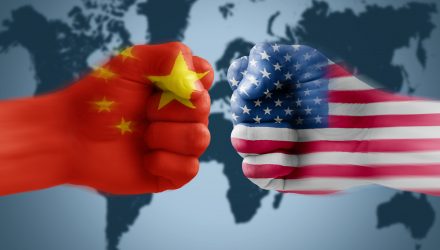The ongoing saga known as the U.S.-China trade negotiations is already taking an even more contentious turn, which could spell trouble for the capital markets this week.
As of 10:45 am ET Monday, the Dow was down about 500 points while the S&P 500 and Nasdaq are down 50 and 207 points respectively, both down for fifth time in six days.
China has announced it will be raising tariffs on roughly $60 billion worth of U.S. goods beginning midnight (Beijing time) June 1, according to China’s State Council Customs Tariff Commission.
On Friday, the U.S. hiked tariffs from 10% to 25% on $200 billion worth of Chinese exports after trade talks held in Washington failed to produce a breakthrough.
On Monday, China announced that:
- Category 1 (includes cotton, machinery, grains) went from 10% to 25%
- Category 2 (includes aircraft parts, optical instruments, certain types of furniture) went from 10% to 20%
- Category 3 (includes corn flour, wine) went from 5% to 10%
- Category 4 (includes certain types of chemical, rare earths, medical equipment like ultrasound and MRI machines) stayed the same at 5%
After a strong first quarter to begin 2019, the second quarter could be marred by trade wars as a U.S.-China trade deal that was priced into the markets went from one with the potential to bear fruit to now one that tastes like bitter fruit–one that China is not willing to swallow.
“At no time will China forfeit the country’s respect, and no one should expect China to swallow bitter fruit that harms its core interests,” the People’s Daily, a newspaper controlled by the Chinese ruling Communist Party, said in a commentary on Monday.
White House economic advisor Larry Kudlow told the “Fox News Sunday” program that China must agree to “very strong” trade deal provisions. Until then, Kudlow said U.S. tariffs would remain.
Despite the latest tough talk, China, however, was staunch in its unflinching stance.
“The perception that China cannot bear it is a fantasy and misjudgment,” the commentary said. “If they weren’t being seriously provoked, the Chinese people would not favor any trade war. However, once the country is strategically coerced, nothing is unbearable for China in order to safeguard its sovereignty and dignity as well as the long-term development rights of the Chinese people.”
The latest comments come after China promised to take “necessary countermeasures” if the Trump administration follows through on its threat to increase tariffs on Chinese goods. China’s Commerce Ministry said that it will make retaliatory moves if U.S. tariffs on $200 billion of Chinese goods are increased to 25% from 10% as promised by the Trump administration.
“The escalation of trade friction is not in the interests of the people of the two countries and the people of the world,” the ministry said. “The Chinese side deeply regrets that if the US tariff measures are implemented, China will have to take necessary countermeasures.”
For investors looking for continued upside in U.S. equities over international equities, the Direxion FTSE Russell US Over International ETF (NYSEArca: RWUI) offers them the ability to benefit not only from domestic U.S. markets potentially performing well, but from their outperformance compared to international markets.
Conversely, if investors believe that international markets will outperform U.S. domestic markets, the Direxion FTSE International Over US ETF (NYSEArca: RWIU) provides a means to not only see international markets perform well, but a way to capitalize on their outperformance compared to the U.S. markets.
For more market trends, visit ETF Trends.

